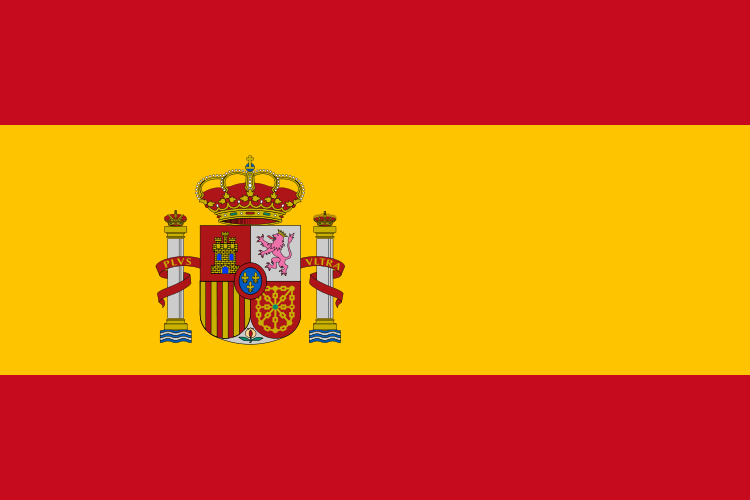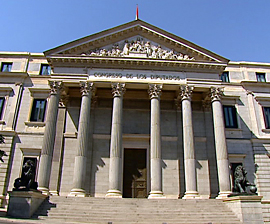Spain is a constitutional monarchy with 350 members (or deputies) elected every four years to the Congreso de los Diputados located in its capital Madrid. There are two main political parties, the right-wing Partido Popular (People’s Party or PP) which currently has a majority of 185 representatives while the left-wing Partido Socialista Obrero Español (Spanish Socialist Workers’ Party or PSOE) forms the main opposition with 110 seats.
Other smaller parties include the two main separatist groups, the Catalan separatist party Convergència i Unió (Convergence and Union or CiU) with 16 seats and the Basque separatist party Partido Nacionalista Vasco (Basque Nationalist Party or PNV) with 5 seats, as well as various others comprising 34 members, including United Left and Amaiur (another Basque separatist party).
As leader of the PP majority party, Mariano Rajoy is the prime minister of Spain (also confusingly known as the president of the government). The leader of the main minority opposition is Alfredo Pérez Rubalcaba, the general secretary of the PSOE. Juan Carlos, as king, is head of state, tracing sovereignty to Philip V, the first Spanish Bourbon (Borbón) king, who came to power in 1713 by the Treaty of Utrecht after the War of the Spanish Succession, which was fought to limit the power of a united French-Spanish Bourbon grand alliance.*
Spain is a relative newcomer to democracy, achieving modern electoral freedom in 1976, after the death of its dictator Francisco Franco (self-styled as Generalisimo). Franco had overthrown the previously elected government of the Popular Front (a coalition of various left-wing parties) in the Spanish Civil War (1936-1939), a bloody conflict that took the lives of as many as 500,000 people.
The Spanish Civil War is still remembered today by those seeking to learn about loved ones who disappeared at the hands of Franco and his Fascist usurpers. In some ways, the Spanish Civil War was the de facto start to World War II, although the Allies were not formally drawn into the conflict by any pacts as they were three years later in Poland. (France and Great Britain purposely avoided entanglement with Nazi Germany and the USSR in the peninsular premamble to world conflict). It was certainly a training ground for Hitler and his gang of thugs.
Its defining moment was immortalized by Picasso in his iconic 11-by-20-foot Guernica, his homage to the barbarism of war, which he created for the 1937 Paris World Fair after the indiscriminate bombing of the defenseless Basque town Gernika.** Outraged by the tyranny in his homeland, Picasso never returned to Spain, requesting that his masterpiece be shown there only when democracy was restored and the country was once again allowed “public liberties.” After more than four decades in New York and other exhibitions around the world, Guernica was brought to Madrid, first to the Prado on September 10, 1981, and then soon after to the Reina Sofía, where it now permanently resides.
The fledgling 1976 democracy was strengthened by the once and future Borbón king, Juan Carlos, Franco’s chosen successor, who instead chose to step aside and give the people of Spain their say, rekindling Spanish democracy. Spain’s entry into the league of modern nations can be traced to the day Juan Carlos upheld Spain’s democracy – June 15, 1977. There have been a few hiccups since, but Spain is now a fully paid-up member of the capitalist world order with the fourteenth largest economy as well as one of the most heavily indebted.
But just what kind of democracy exists – neo-conservative, neo-liberal, social democrat, socialist, names variously used to describe today’s democracies? Most of Europe fancies itself as Social Democratic, either of the tried-and-true German variety – requiring strong leadership to enact its economy first, social progress next ideals – or the French model, remarkably being nudged now by its president, François Hollande,*** from traditional Socialism to a centrist path. To be sure varying degrees of laissez-faire neo-conservatism and so-called “third-way” neo-liberalism.
However, with its calls against separatism (particularly in Catalonia), watered-down women’s rights (especially anti-abortion), restrictions to public demonstrations, and attacks against everyday worker rights, the Spanish government could be attempting to rekindle its own idea of a Christian, authoritarian, me-first society. But in fact, Spain is rather more like most governments; business-run elites, where corporations call the shots on major economic policy. In Spain, 20 people hold as much wealth as the poorest 20%, almost 3 million live in dire poverty, and major multinational tech giants pay little or no tax.****
Indeed, a country with 26% unemployment (40% youth unemployment) while enjoying one of the largest tourist economies in the world (with over 60 million annual visitors) and the largest wine-producing capacity in the world is barely disguised as a democracy, even if its electoral future is secure (a minimal criteria of a democracy). Unable to solve crippling economic problems, the path of most modern democracies today is to turf the ruling party out and hope the next crowd will do better, thus ensuring a flip-flop of PP/PSOE governments in the coming years. To be sure, all politicians’ careers end in ruin. But a whole new way of thinking is needed to decide what democracy really is and what indeed constitutes a nation. 20 people equal to 20%, 3 million in dire poverty, 40% youth unemployment, crippling national debts are no way to live.
I wonder what the Cubist master would have said of our newly fragmented society where so few have so much and so many nothing. Part millionaire Communist playboy, part pacifist conscience for a shockingly over-militarized world, part artistic saviour consecrating hope after having destroyed it, one wonders if even Picasso could bring light to the new madness. We now take such crass indecency for granted, while so-called democratic governments continue to heap austerity on those who can’t cope, never mind restricting women’s rights, allowing bankers to run amok, or even renaming its central square after a mobile phone company. The truth is democracy has been sold to the highest bidder.
Would that we could repel the “ocean of pain” that has become modern democracy, nascent or otherwise? We need more than “love and toys.”



